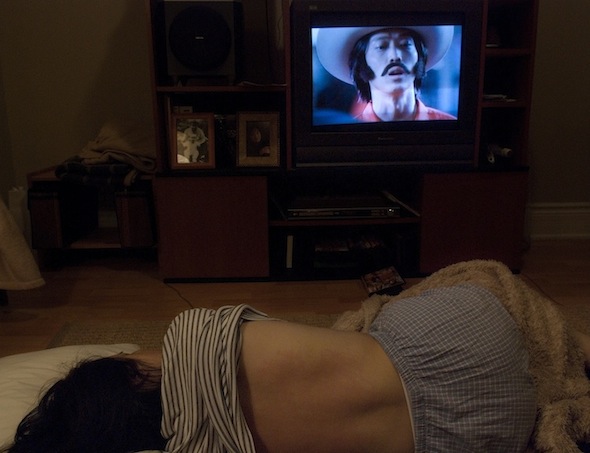
Intimacies
My Le Nguyen, Immony Men
A Space Main Gallery
November 2 – December 8, 2012
Essay by: Stephanie Lam
Dwelling in the space between private memory and public display, Immony Men’s installation work, Effections: “We need to talk,” and My Le Nguyen’s photographic series’ My Parents and Switch, draw on the idea of the screen as a mediating surface. While both these artists use very different work processes, they are ultimately engaged in acts of translation. In the case of Men—whose work involves the painstaking process of repeatedly crumpling sheet after sheet of paper and scanning them into a computer—translation occurs at the level of the material, wherein the labor of the hand has the power to reinvest the digital image with an artisanal value typically associated with analog forms. In the case of Nguyen’s photographs of watched or unwatched television screens, translation occurs at the level of cultural positioning: waiting, observing, documenting moments and spaces where communication does not happen, where translation in fact fails. Common to both these artists is an attempt to activate the screen as a surface for exteriorizing that which we would consider private—interior landscapes, amorphous worlds that are specific to us as individuals, as families, and as members of larger communities.
Biographies
Born in Danang, Vietnam, My Le Nguyen came to Canada at the age of nine. Her work as a photographer and a home visiting nurse closely intertwine in a dialogue that explores transitional and transformative experiences, such as moving from one country to another or growing old. As an artist who is both Vietnamese and Canadian, she focuses on the nature of her identity as something located in-between two cultures. Rather than depicting a struggle within that state, her practice is concentrated on locating that middle ground and recognizing it as an important and common existence for many people. Communication barriers and the sense of distance and alienation that routinely define our lives are continual themes in her work. Nguyen is regularly drawn to domestic interiors and transitional living environments–such as hotels or hospices—and how they can reflect these psychological conditions. The television screen is a recurring motif in her work for its ability to present a parallel, inaccessible world within these spaces. My Le has exhibited throughout Vietnam and Canada, including participating in the Toronto CONTACT Photography Festival twice. Her work has been featured in Vietnamese national newspapers and magazines.
Immony Men is a graduate of the Masters of Fine Arts Visual Arts program at University of Windsor. He has completed his Bachelor of Fine Arts at Concordia majoring in Interdisciplinary Studies within Studio Arts. He is a Canadian visual artist currently based in Montreal and Toronto. Taking Care of Business, a previous body of work by Men involving the painstaking installation of post-it notes on gallery walls, had been shown in Canadian artist-run centers over the past seven years. His focus is on installation and working between the lines of fact and fiction. Labour intensity is a strong element in his installation art practice: “My interests lie in the intimate relationships that exist in these daily routines. The separation between experiment and experience in my work is paper-thin.” Immony Men is currently collaborating with Maegan Broadhurst in designing research frameworks in order to facilitate public dialogues within the community, as well as collecting malleable data to assemble an emotional map of the city. They are interested in exploring different qualitative and quantitative research methods through community collaboration within their fieldwork to better understand the public memory of urban and suburban environments within Canada.
Stephanie Lam is a PhD student in the Film and Visual Studies program at Harvard University. Her research interests include film/media theory and history, with particular emphasis on modernity, technology and the senses, experiences of time and the moving image, animal studies, and diasporic cinemas. She completed her MA in Film Studies at the University of Toronto.